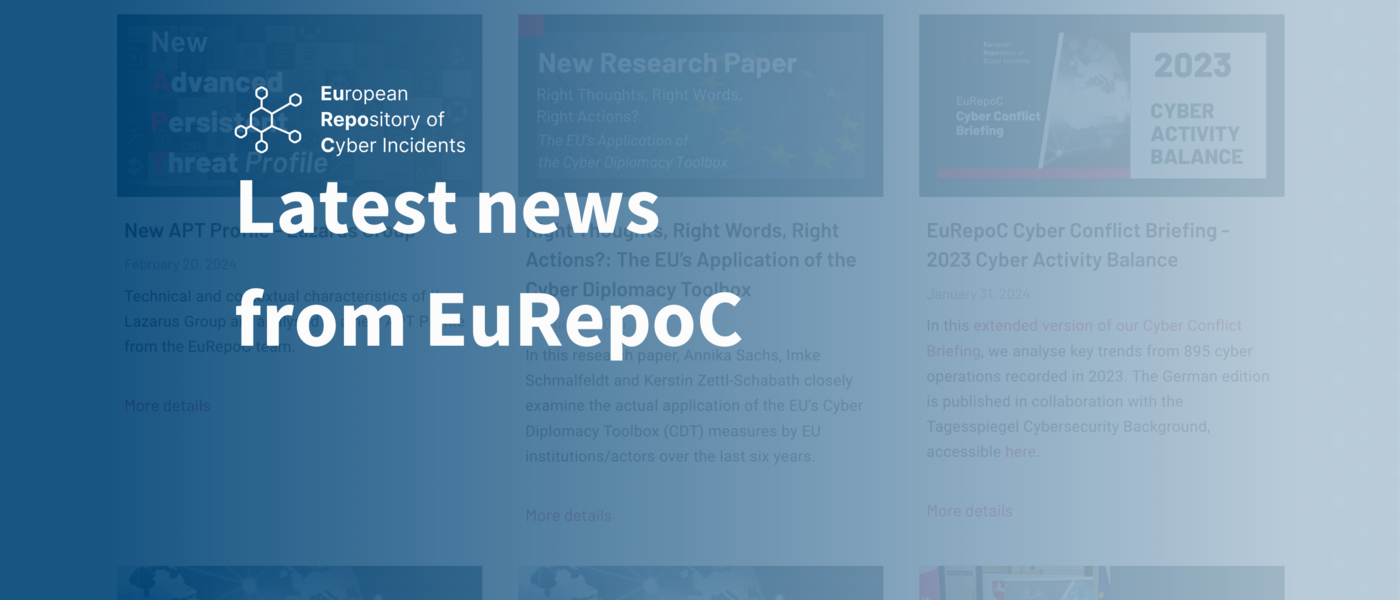European Repository of Cyber Incidents (EuRepoC)

Cyber attacks against states, ransomware paralysing hospitals, espionage against civil society organisations — cyber attacks have become ubiquitous. Their aim: to sabotage, blackmail, harm and spy on states, companies and private individuals.
But who is behind them? What political motives and agendas drive their actions? Are they linked to governments? And what measures should the European Union take to effectively counter such attacks?
The European Repository of Cyber Incidents (EuRepoC) has been dealing with these and other questions since November 2022. The aim of the politically independent research consortium is to provide up-to-date information, data and analyses on cyber attacks in order to raise awareness of cyber security threats.
Open-access database and dashboard
At the heart of the project is a freely accessible database in which cyber attacks relevant to foreign and security policy are continuously and systematically recorded worldwide. For this purpose, the data is subjected to multi-level coding and assigned to 60 different categories – according to political, legal and technical criteria. The data sets are continuously expanded, freely accessible and downloadable. An interactive dashboard allows users to compare the implications of and reactions to individual incidents and to identify trends (see explanatory video).
In addition, the findings from the project are used for academic articles and workshops. To maintain the highest scientific standards, all publications produced by the project are subjected to a rigorous internal peer review process.
Funding
Since March 2022, the project has been funded – initially for two years – by the Coordination Group for Cyber Foreign Policy at the German Foreign Office and by the Danish Ministry of Foreign Affairs. It is planned to involve additional European partners and funders.
Project Team
The team consists of researchers from the University of Heidelberg (Germany), the University of Innsbruck (Austria), Stiftung Wissenschaft und Politik (Germany) and the Cyber Policy Institute (Estonia). It is an interdisciplinary European project that combines information sciences with social sciences and law.
Universität Heidelberg, Institut für Politische Wissenschaft (Consortium Lead Organisation)
Kim Schuck (Project Coordinator)
Universität Innsbruck, Institut für Theorie und Zukunft des Rechts
Prof. Matthias C. Kettemann, LL.M. (Harvard)
Stiftung Wissenschaft und Politik
Cyber Policy Institute
SWP Publications of the EuRepoC Project
-
Enhancing EU-NATO Cooperation in Preparedness and Critical Infrastructure Protection
Research Division EU/Europe, Working Paper Nr. 06/2025, June 2025, 15 pages -
Cyber Activity Balance 2024: The European Union in Focus
Research Division EU/Europe, Working Paper Nr. 03/2025, February 2025, 11 Pages -
Learning to live with the threat? Understanding Europe’s cyber defense approach
Political espionage, ransomware paralysing hospitals, surveillance software targeting civil society organisations – cyber threats are omnipresent. Annegret Bendiek and Jakob Bund are talking about increasingly sophisticated threats and the challenges of effective responses to cyber attacks. Host: Esme Nicholson.
SWP Podcast 2023/eP 03, 28.09.2023 -
Shifting Paradigms in Europe’s Approach to Cyber Defence
Ambitions to Disrupt Malicious Cyber Activity Need to Protect Norms as Well as Networks
SWP Comment 2023/C 48, 25.09.2023, 8 Pagesdoi:10.18449/2023C48
-
The Absolute Ideal: Military Cyber Capabilities in War and Society
Working Paper Research Division EU/Europe 2023/Nr. 03, June 2023, 55 Pages -
Cyber Operations in Russia’s War against Ukraine
Uses, limitations, and lessons learned so far
SWP Comment 2023/C 23, 17.04.2023, 8 Pagesdoi:10.18449/2023C23
